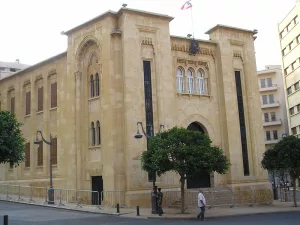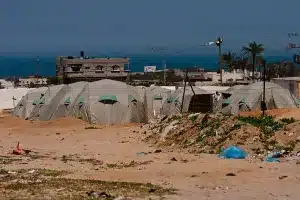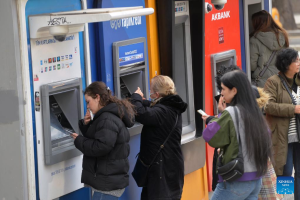Confrontations between Israel and Hezbollah, a Shiite military group in Lebanon, on Lebanon’s southern border have had a disastrous effect on the country’s tourism sector, said industry experts.
Due to the ongoing border tension that has lasted for more than seven weeks, many hotels outside of Beirut, the capital of Lebanon, were forced to close, while most hotels in Beirut operate partially, said Pierre Ashkar, head of the Syndicate of Hotel Owners in Lebanon.
Tensions along the Lebanon-Israel border escalated after Hezbollah fired dozens of rockets toward Shebaa Farms on Oct. 8 in support of the Hamas attacks on Israel the previous day, prompting the Israeli forces to respond by firing heavy artillery toward southeastern Lebanon.
Statistics released by the Civil Aviation Authority at the Beirut Rafic Hariri International Airport showed a year-on-year drop of 15 percent in the number of passenger arrivals in Lebanon in October, and a year-on-year increase of 15.5 percent in the number of passengers leaving the country in the same month.
Moreover, the number of passengers travelling to and from Lebanon dropped by 38.53 percent in the first week of November compared to the same period last year, with the number of arrivals decreasing by 41.75 percent and departures going down by 35.46 percent.
Jean Abboud, head of the Syndicate of Tourism and Travel Agencies, said Lebanon was supposed to receive several groups of European tourists on a daily basis until the end of 2023, but all reservations have been canceled following the border tension.
“The border tension’s impact on the tourism sector is catastrophic,” Abboud said, adding that Lebanon’s tourist activities have declined by 80 percent since the start of the border tension in early October compared to the same period of last year.
Abboud added that plane tickets sales dropped from 5,000 tickets a day before the border tension to 400-600 per day currently.
According to Tony Ramy, president of the Syndicate of Owners of Restaurants, Cafes, Nightclubs, and Pastries in Lebanon, businesses at restaurants dropped by 60-80 percent during working days and by 30-50 percent on weekends.
Ramy noted that restaurants are currently suffering significant losses and need to struggle to stay in business by effectively handling the crisis until the end of the year.
“To sustain their operations, restaurants will need to focus on attracting local clients by reducing prices,” he said.
Last week, Hamas and Israel agreed to a four-day cease-fire in the Gaza Strip, which was set to expire on Tuesday. On Monday, the truce was extended for an additional two days.
The southern Lebanese border saw a brief period of cautious calm after the truce went into effect on Nov. 24. At dawn on Nov. 25, however, Israel fired a rocket at the village of Mays al-Jabal in southern Lebanon, the National News Agency reported.
Ashkar was not optimistic about a promising Christmas and New Year season this year, noting that traders and businesses cannot depend heavily on the holiday season to turn a profit and offset losses from less lucrative seasons.
“A number of countries have imposed a travel ban on Lebanon. Even if the conflict stops, it will take some time for these countries to lift the ban and a few more months for Lebanon to market its tourism activities,” Ashkar said.
Nassib Ghobril, an economist and head of the economic research department at Byblos Bank, said the border tensions had added uncertainty and negatively impacted consumer confidence. He did, however, project that Lebanon’s economy would expand by slightly less than 2 percent this year as opposed to seeing no growth in 2022 because the nation’s tourism industry had a stellar summer and other sectors, like trade and industry, performed well.
Ghobril highlighted the tourism sector’s economic significance, saying that it employs 20 percent of the labor force and has contributed 13.7 percent of GDP in 2022






